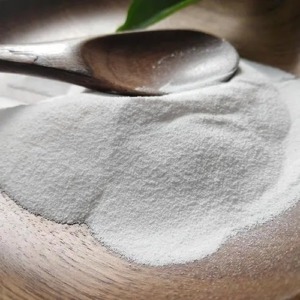General Details
Product name: Sodium Butyrate food grade
Molecular formula: C4H7NaO2
Physical appearance: White powder
Chemical specification: Content: ≥99.0%, Melting point: 250.0-253.0 ℃, Molecular weight: 110.09 g/mol
What is Sodium Butyrate
Sodium butyrate is the sodium salt of sodium butyrate and short-chain fatty acids. It is a natural by-product of the fermentation of dietary fiber in the large intestine.
Butyrate is a fatty acid fermented anaerobically from dietary fibers such as cellulose in the colon and can combine with sodium to form a salt called sodium butyrate. Butyrate is a potent antidote to ammonium salts and neurotoxins that promote the formation of gut-friendly or commensal bacteria. Research suggests that butyrate may also inhibit the development of colon cancer.
Several animal-based studies have shown that repeated use of sodium butyrate as a supplement can restore memory loss and cognitive impairment in people with Alzheimer’s disease or other forms of aging.
Functional Properties and Applications
I. Core Functions
1. Acid Regulation & Preservation
– Mechanism: Releases butyrate ions (C₃H₇COO⁻) upon dissolution, lowering environmental pH and inhibiting bacterial enzyme activity (e.g., *Salmonella*, *E. coli*).
– Applications:
– Extends shelf life by 15%-30% in meat products (ham, sausages);
– Reduces mold growth in baked goods (bread, cakes), enabling lower usage of synthetic preservatives (e.g., potassium sorbate).
2. Flavor Enhancement
– Unique Trait: Imparts a mild cheesy/fermented aroma, mimicking natural fermentation.
– Applications:
– Replaces artificial flavors in snack seasonings (chips, puffed foods);
– Enhances palatability in pet food (wet formulas), reducing reliance on appetite stimulants.
II. Advanced Functions (Cross-Industry Applications)
3. Gut Health Modulation
– Mechanism: Butyrate serves as the primary energy source for colon epithelial cells, promoting mucosal repair and probiotic growth (e.g., *Bifidobacterium*).
– Applications:
– Functional foods (probiotic beverages, meal replacements);
– Feed additives for livestock (swine, poultry), reducing diarrhea incidence by 20%-40%.
4. Anti-Inflammatory & Immune Regulation
– Scientific Basis: Inhibits histone deacetylase (HDAC) activity, modulating macrophage responses and suppressing pro-inflammatory cytokines (e.g., IL-6).
– Potential Uses:
– Pharmaceutical excipients (e.g., carriers for colitis drugs);
– Anti-inflammatory ingredients in premium pet health products.
III. Emerging Applications
5. Clean-Label Preservation
– Market Trend: Rising demand for “chemical-free” preservatives in clean-label products.
– Advantage: Partially replaces synthetic preservatives (e.g., sodium benzoate), compliant with EU E282 standards.
6. Cosmetic Delivery System
– Innovation: pH-sensitive carrier for controlled release of actives (e.g., vitamin C, peptides), enhancing skincare penetration efficiency.
IV. Safety & Regulatory Compliance
– Certifications: Meets China GB 1886.189-2016, U.S. FDA 21 CFR 184.1755, and EU EFSA (E282) standards. No specified ADI limit (*when used per GMP*).
– Eco-Friendliness: Biodegradable with no persistent environmental risks.
Food-grade sodium butyrate is a versatile additive integrating *preservation*, *health-enhancing*, and *sustainability* benefits. Its multifunctionality simplifies formulations and reduces costs across food innovation, animal nutrition, and wellness industries.
